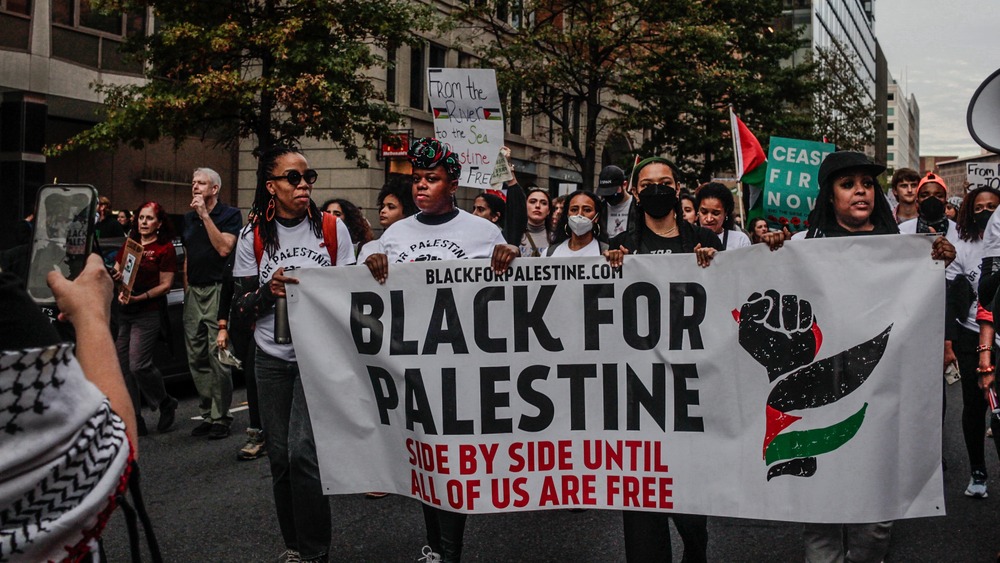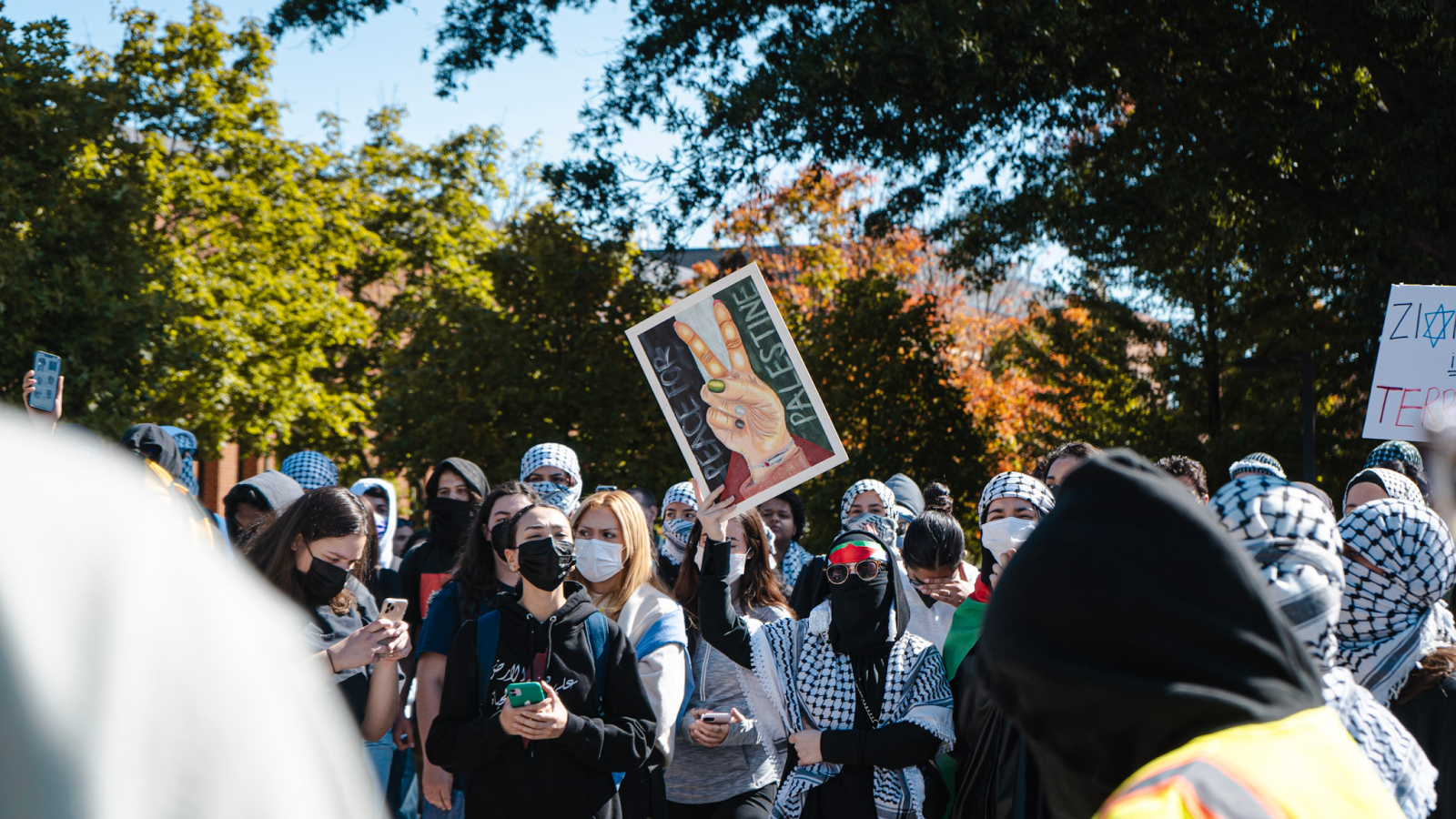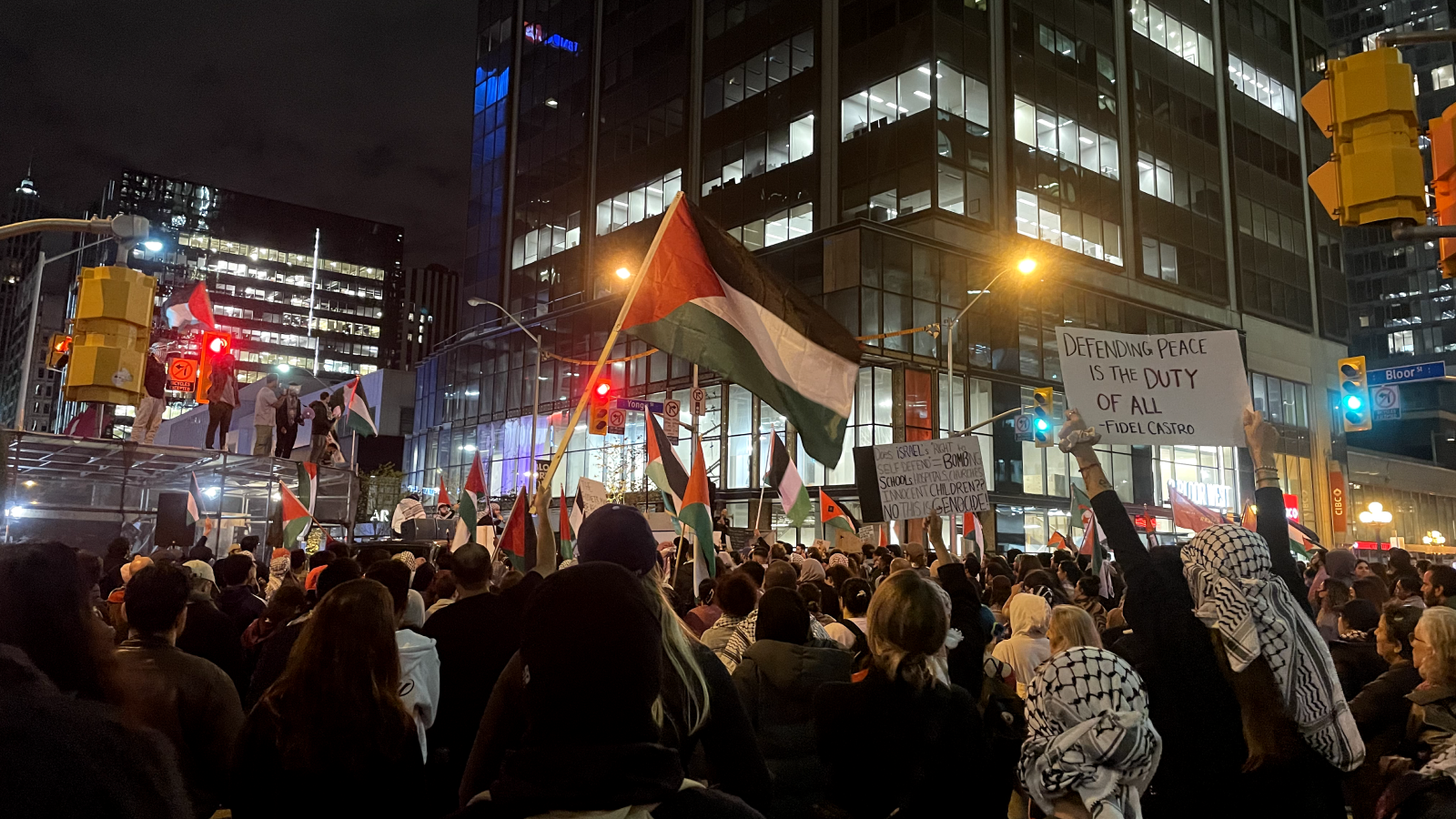As Malini Ranganathan stood shoulder-to-shoulder with hundreds of thousands of protesters in the streets of Washington, D.C., she looked ahead to see a young boy on his father’s shoulders, cupping his hands around his mouth as he led the crowd in a chant: “Gaza, Gaza, don’t you cry, we will never let you die.”
It was a scene she won’t soon forget. In the decade since she has lived in America’s capital, Ranganathan has attended dozens of protests for causes ranging from the Women’s March to climate action to gun control. But nothing prepared her for Saturday’s demonstration for Palestinian rights in D.C.’s Freedom Plaza and its surrounding streets.
“This was bigger than anything I ever imagined,” says Ranganathan, a professor of international studies at American University. “The numbers were massive in D.C. I’ve never seen anything like it in my 10 years of living here.”
Indeed, most estimates put the crowd as exceeding 100,000, with some reaching 300,000. Though exact figures are unavailable, organizers believe it is the biggest march for Palestine in U.S. history.
For the fourth weekend in a row, tens of thousands of people demonstrated in cities from London to Lagos to Los Angeles in response to Israel’s unrelenting siege on Gaza that has killed more than 10,000 civilians since Oct. 7.
In the United States alone, the Crowd Counting Consortium research project has logged more than 900 pro-Palestine protests, rallies, demonstrations and vigils between Oct. 7 and Nov. 4, with a conservative estimate of more than 500,000 participants. These American rallies have seen a heightened sense of urgency, with many protesters feeling complicit as their tax dollars fund Israel’s war. Protesters have increasingly begun to call out President Biden for enabling what they’re describing as a “genocide.”
“I have been fighting this for a long time, and I’ve never seen our side this strong,” says Palestinian American historian Rashid Khalidi.
As U.N. experts, too, warn that the “Palestinian people are at grave risk of genocide,” the global chorus of Israel’s dissenters demanding a ceasefire is growing at a rapid clip. The world hasn’t seen these kinds of mass protests since the 2003 demonstrations against the Iraq War.
Even as McCarthyite backlash — especially on college campuses — grows, it’s a clear sign of an unprecedented shift in favor of Palestinians, whose cause has historically been on the fringes even in liberal politics. Some longtime activists say this moment represents a major turning point for the global mass movement in support of Palestinian self-determination.
“I have been fighting this for a long time, and I’ve never seen our side this strong,” Palestinian American historian Rashid Khalidi tells Analyst News. The author of The Hundred Years’ War on Palestine, he is the preeminent scholar of Palestinian history in the English-speaking world. “I’ve never seen students so galvanized, in spite of fierce repression of their views by universities.”
In recent days, the phrases “never seen” or “never in my life” — or some version of them — have been echoed in surprise and optimism by all stripes of activists and supporters of the Palestinian cause.
“Never in my life did I think I would see this many people protesting for Palestinian rights in the U.S. The movement is enormous and still growing,” Yonah Lieberman, a co-founder of the Jewish group If Not Now, wrote on social media. His group organized other demonstrations around the country, swarming New York City’s Grand Central Station and D.C.’s Capitol rotunda.
Ruwa Romman, a Palestinian American state representative in Georgia, shared a similar sentiment: “I’ve never in my entire life seen this kind of massive and sustained protesting for Palestinians, particularly from such a broad coalition. It’s so heartening.”

A broad, sustained coalition
Christian Ball, a software engineer from London, had never attended a demonstration or rally for Palestine. But when the siege on Gaza began, he knew he had no choice. On Oct. 28, Ball marched through central London with roughly 100,000 others to demand a ceasefire in Gaza.
“As a white, middle-class British man, I’ve lived a life of privilege and comfort in comparison to most Palestinians,” he says. “Their oppressor has a powerful army, huge funding, is supported by most Western nations and politicians, and is defended by most Western mainstream media … All the Palestinians have are each other, their faith, and those around the world who are willing to speak up for them.”
In the past, it was unusual to hear this kind of rhetoric from those not directly connected to the cause.
It’s this ability to draw new supporters that has bolstered the movement, says Nashwa Bawab, a Palestinian American editor and organizer with the Palestinian Youth Movement, one of the groups that sponsored Saturday’s D.C. march. As someone who has been doing this work for years, she’s noticed a wider group of people embracing the cause.
“It’s a broader base of people. There are people who’ve never heard about Palestine whose daily lives are being disrupted by what they’re seeing … and they’re joining the cause,” says Bawab. While Arab and Muslim communities are typically at such protests, the coalitions have expanded. “I’m seeing more and more different sectors of society — students, healthcare workers, the Filipino community, the Korean diaspora, the black liberation movement and others are all coming out in support of us.”
“Their oppressor has a powerful army, huge funding, is supported by most Western nations and politicians, and is defended by most Western mainstream media. All the Palestinians have are each other, their faith, and those around the world who are willing to speak up for them.”
Amna Awan, a marketer from Chicago who attended her first protest ever in October, was surprised by the diversity of people marching for a ceasefire.
“You saw every person from every walk of life. You saw kids in strollers, you saw elderly people. You saw black, brown, white people. You saw Muslim, Jewish — people with yarmulkes, people with hijabs — you saw it all,” she says. “All of these people have different perspectives, but they all feel united in a cause.”
In the past, Bawab says, it’s been difficult to sustain public attention and support. This fall, things have been different.
“We have been able to maintain masses of people coming out for almost a month now,” says Bawab. “Every week there’s more and more people. And usually how these things go is that people come and that beginning and then they sort of die off. That isn’t happening this time.”
Ball, the engineer from London, says he intends to remain committed to the cause. “We’re looking at thousands of … defenseless people, children, being bombed out of existence,” he says. “Most of us have been silent too long. Silence is complicity.”
Shifting the narrative
The horrifying images and mounting death toll of civilian casualties out of Gaza in the last month have certainly galvanized people who may not have paid attention to the Palestinian situation in the past. But experts say there has also been a gradual change in public opinion and a challenging of traditional narratives in the last decade.
“There has been a long-term shift over the last 10 or 12 years, especially among young people — among younger segments of the Jewish community, among university students, among minorities,” says Khalidi, who teaches at Columbia University.
“It’s partly a function of younger people having contempt for and not consuming mainstream media. They’re more worldly, more widely traveled, and they see the world a little bit differently.”
The social upheaval of the last two decades has played a role, as well. Young people have lived through two major wars, the climate crisis, police brutality and Black Lives Matter, extreme income inequality and more. “They’re already primed in many ways to see injustice in a way that’s very different than their parents did,” says Ranganathan, who also teaches college students.
Khalidi says this has been particularly evident on college campuses. “Twenty years ago, there was no pro-Palestine movement at all. And by 2020, on campus after campus, large majorities [of students] voted asking their universities to divest from companies that supported the Israeli occupation. I mean, that’s a big shift.”
“It’s quite clear from recent polling that Americans of all political persuasions are no longer eating up anti-Palestinian narratives.”
Those critiques have spilled into mainstream society. Even Joe Rogan, America’s most popular podcaster with an audience of 15 million, said on his show in 2021 that attitudes were changing.
“The way the mainstream media was portraying it in this country was always that ‘Israel’s the good guys, the Palestinians are the bad people,’” he noted then. “[That’s] how it was. But the mainstream perception now has very much shifted.”
The numbers seem to bear it out.
In 2013, a Gallup poll found that Americans sympathized with Israelis over Palestinians 64% to 12%. In a poll held earlier this year, that gap had narrowed to 54% vs 31%. By mid-October, a poll from Data for Progress concluded that 66% of all Americans favored a ceasefire in Gaza.
“It’s quite clear from recent polling that Americans of all political persuasions are no longer eating up anti-Palestinian narratives,” Middle East analyst Khaldoun Khelil tells Analyst News.
And it’s also clear younger Americans are particularly skeptical of Israel’s actions. A mid-October CNN poll found that only 27% of Americans ages 18 to 34 believe the military response to the Oct. 7 Hamas attack is fully justified.

A youth-led movement
Khalidi says that younger generations in America are leading the movement — and they see Israel differently than their parents and grandparents, who view the nation as a blooming democracy in the desert.
“They don’t know Israel as a tiny little beleaguered nation in the midst of this vast ocean of fanatical, bloodthirsty Arabs. They see Israel as a superpower,” he says. “They also see the other stuff. They see it’s not really democratic. It’s democratic for its Jewish citizens and not for its Arab subjects.”
There’s no doubt that access to independent and social media has helped challenge traditional narratives. Through social media, Palestinians themselves have been able to show the world their situation without being framed by Israeli or American media.
“While Americans are unfortunately subjected to a great deal of misleading propaganda, the systemic apartheid in Israel is very obvious to even the most casual observer,” says Khelil. “Israel’s segregated roads, living spaces and schools play very badly to an American audience who grew up revering the work of Martin Luther King Jr. and Nelson Mandela.”
And since the siege on Gaza began on Oct. 7, young people have especially been getting news of the horrors directly from Palestinians on social media. Gazan journalists Motaz Azaiza, Plestia Alaqad, Belal Khaled, Yara Eid and Hind Khoudary, among others, have livestreamed as hospitals, churches, universities and refugee camps were bombed, and as Palestinian parents picked through the rubble to find their buried children.
“Many of us thought we were ‘woke’ before and that we understood the systems at play, but there’s been a reckoning on a whole different level where we’re really realizing that the systems we’ve been told were meant to protect us are genocide machines.”
“I felt like throughout this conflict, I’ve had a front row seat to everything,” says Awan, who has been amplifying what she sees to her own friends on social media. “We are not just getting our news from one singular source — having that diversity of perspective has really opened our eyes.”
Mara Greenberg says that the last few weeks have particularly opened her eyes. Analyst News is not using her real name; like many interviewees, she requested anonymity because of fears of being doxxed. Greenberg lives in New York City, where she attended two marches before going to the national rally in D.C.
“Many of us thought we were ‘woke’ before and that we understood the systems at play, but there’s been a reckoning on a whole different level where we’re really realizing that the systems we’ve been told were meant to protect us are genocide machines,” says Greenberg, who is 24. “That’s what our generation is known for … we are not afraid to be critical of systems.”
But that criticism comes at a price. In October, the U.S. Senate passed a resolution deeming pro-Palestine student groups as antisemitic and “pro-Hamas.” At Columbia University, students who signed a letter that said “there can be no future of safety and freedom for all Israelis and Palestinians without holding the Israeli occupation accountable for its actions” have been subjected to extreme doxxing. A conservative organization sent a “doxxing truck” to campus, plastering the names and photos of those who signed under the caption “Columbia’s Leading Antisemites.” A similar truck was sent to the campuses of Harvard University and the University of Pennsylvania.

The ferocity of the backlash
Attempts at stifling support for Palestinians have been especially fierce in recent weeks, as people have been tarred with such claims of antisemitism, lost jobs, and faced enormous backlash for not supporting Israel and its policies. Critics have accused protesters of antisemitic hate and supporting Hamas, though many demonstrations have been organized and attended by Jewish activists.
While the pushback is certainly having a chilling effect, advocates say, the severity of the clampdown is evidence that the movement is gaining strength and that the resistance is having a real impact.
“The fear and ferocity of the backlash is actually justified — which is to say the fear of losing the discursive high ground is justified. Because they don’t actually have any arguments. It’s why they resort to shutting down the debate,” Khalidi says.
“It’s very hard to justify the kinds of positions taken by the Israeli governments,” he says. “The nation-state law of 2018 says that only Jewish people have the right to self-determination here. How do you justify that? How do you justify what settlers are doing in the occupied West Bank? How do you justify religious nationalism? You can’t. There are no arguments. So what you have to say is people who are calling for Palestinian rights are, in fact, antisemites — that they’re beyond the pale.”
Though the movement is gaining strength, many are skeptical it will lead to real policy change. The U.S. government, which sends $3.8 billion in unconditional aid to Israel every year and is planning to send another $14.5 billion in the coming days, has repeatedly shut down calls for a ceasefire.
“It’s very hard to justify the kinds of positions taken by the Israeli governments. You can’t. There are no arguments. So what you have to say is people who are calling for Palestinian rights are, in fact, antisemites — that they’re beyond the pale.”
Even the country’s most infamous leftist, Sen. Bernie Sanders, has resisted advocating for a ceasefire. For years, the pro-Israel lobby in America has poured millions of dollars into politicians’ election campaigns; as these politicians gear up for the 2024 elections, many are reluctant to jeopardize that funding.
“Our system of governance is deeply broken. Too many elected officials do not represent their constituents,” says William Lafi Youmans, a professor at George Washington University and a longtime advocate for Palestinian rights who attended Saturday’s protest in Washington.
“They’re beholden to special interests with narrow, destructive agendas that benefit from killing Palestinians,” he says. “We have the most cynical, most immoral members of Congress I’ve ever seen. The way they see people as completely expendable has taken away from me any faith in this country.”
But Khalidi believes that, while their cause remains an uphill battle, protesters must not give in and lose hope. History shows that public opinion is often slow to affect policy on wars, he argues.
“The political class are always the last to shift,” he says. “It was the same with apartheid in South Africa. Churches, academics — everybody was against apartheid before the Reagan administration or the Thatcher administration finally changed their policies.”
Ranganathan isn’t blind to the reality of the current political situation. But she believes that the mass movement to protect Palestinians from what increasingly appears to be an existential threat has reached a crucial inflection point.
“The people demand an end to U.S.-supported genocidal slaughter. The people demand an end to apartheid. The people demand a ceasefire now,” she says. “This energy cannot be silenced. This movement cannot be crushed.”

